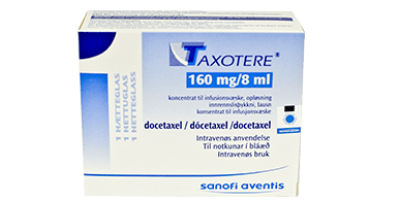Taxotere: Side Effects and Safety Information
Taxotere (docetaxel) is a chemotherapy drug used to treat breast and other cancers. Its common side effects include nausea, vomiting and hair loss. Studies linked the drug to permanent hair loss, leading to warning label changes and legal actions.
- Last update: June 30, 2025
What Is Taxotere (Docetaxel)?
Docetaxel, commonly known by its brand name Taxotere, is a chemotherapy drug that treats several cancer types, including breast and prostate cancer.
It belongs to the taxane class of chemotherapy drugs and works by stopping cancer cells from dividing. Originally approved in 1996 to treat breast cancer, Taxotere has since received approval to treat several other cancers.
- 1996: Breast cancer
- 1999: Non-small cell lung cancer
- 2004: Prostate cancer
- 2005: Stomach cancer
- 2007: Head and neck cancer
Sanofi manufactures and distributes Taxotere, which remains a commonly used chemotherapy drug for breast and other cancers.
Common and Serious Side Effects of Taxotere
According to the drug’s label, Taxotere’s most common side effects include infections, blood disorders and nausea. Its potentially severe side effects may include eye disorders, abnormal physical weakness and neurologic reactions.
- Alopecia (hair loss)
- Anemia
- Anorexia
- Asthenia (abnormal physical weakness)
- Constipation
- Diarrhea
- Dysgeusia (changes in taste)
- Dyspnea (shortness of breath)
- Fever
- Fluid retention
- Hypersensitivity
- Infections
- Mucositis (mucous membrane inflammation)
- Myalgia (muscle pain)
- Nail disorders
- Nausea
- Neuropathy (nerve pain, numbness and tingling)
- Neutropenia (low white blood cell count)
- Pain
- Skin reactions
- Thrombocytopenia (low platelet count)
- Vomiting
Tell your doctor about any side effects you experience to make sure they aren’t signs of a more serious problem.
Serious Taxotere Side Effects
Taxotere can also cause rare but serious side effects, including death. It’s important to discuss the following symptoms and conditions with your doctor.
- Low white blood cell count
- This can lead to life-threatening infections, and the first sign is often a fever. Inform your medical provider right away if you have a fever.
- Swelling in the colon and intestines
- This can lead to death. Tell your doctor about any new or worsening abdominal pain, diarrhea or fever.
- Severe allergic reactions
- Seek emergency medical care if you suffer from facial swelling, trouble breathing, difficulty swallowing, hives or rashes.
- Fluid retention
- Symptoms include weight gain, shortness of breath and swelling in the hands and feet. This can be life-threatening. Doctors prescribe drugs called corticosteroids that patients take before Taxotere treatment to minimize the risk of fluid retention. Tell the nurse or doctor if you forgot to take your corticosteroid dose before Taxotere treatment.
- New cancer risk
- Some people have developed new cancers after Taxotere treatment. These include kidney cancer as well as certain blood cancers and non-Hodgkin lymphoma.
- Severe skin problems
- These include red scaly rashes, blisters on any part of your body and swelling of the legs and arms. Flu-like symptoms or fevers may accompany these symptoms. Tell your doctor immediately if you have any skin changes.
The risk of death with Taxotere treatment is higher in people with liver problems, those receiving high doses of Taxotere and those with non-small cell lung cancer who have used chemotherapy drugs containing platinum.
Permanent Hair Loss From Taxotere
While temporary hair loss is a common side effect of chemotherapy treatment, studies have found that Taxotere may cause permanent hair loss, or persistent chemotherapy-induced alopecia (pCIA). Patients have pCIA when their hair does not completely grow back six months after stopping treatment.
This can have a serious impact on a patient’s life, and it may even lead to inconsistencies with treatment. Patients have referred to the permanent hair loss as “devastating,” “depressing” and “very upsetting.”
One former Taxotere breast cancer patient, Amy Dodson, shared her story with Drugwatch. Dodson said no one ever warned her about permanent alopecia. Dodson said permanent hair loss affected her marriage, self-esteem and self-image, along with the lives of her kids.
Even after she was in remission and had not had treatment for five years, strangers would think she was still an active cancer patient because of her hair loss.
Studies of Taxotere and Permanent Hair Loss
Over the years, a few studies have linked Taxotere to permanent hair loss.
-
2012
A study in Annals of Oncology looked at hair loss results from women who had undergone chemotherapy with fluorouracil/epirubicin/cyclophosphamide (FEC) followed by docetaxel. Women lost hair on their scalp, eyebrows, eyelids, pubic area and lower limbs within two weeks. Four to six months after completing docetaxel treatment, their hair had not fully regrown.
-
2018
A study in Breast Cancer Research and Treatment found that people taking high doses of docetaxel had “significantly higher” rates of hair loss than people who received lower doses or other forms of chemotherapy. About 10% of these docetaxel patients wore wigs following treatment.
-
2024
A review in Current Oncology noted that docetaxel alone causes hair loss in about 34.3–42.9% of patients. When combined with other therapies, the prevalence of hair loss increases. Higher doses of docetaxel also increase the occurrence of hair loss.
How Taxotere Side Effects Tie Into Legal Action
People who filed Taxotere lawsuits against Sanofi claimed the company knew that the drug could cause permanent hair loss but failed to warn patients. Sanofi eventually changed the label to mention permanent hair loss in 2015.
As of May 2025, more than 6,400 cases are still pending in multidistrict litigation (MDL) in the U.S. District Court for the Eastern District of Louisiana. Multidistrict litigation groups multiple similar cases together into one legal proceeding to streamline the legal process.
FDA Warnings, Label Changes & Manufacturer History
Taxotere first received FDA approval in 1996, and Sanofi didn’t change Taxotere’s label to warn about permanent hair loss until 2015. Before the label change, Taxotere’s original label said “hair generally grows back.”
Between 2004 and 2008, the FDA approved several label changes requested by Sanofi, but none of them mentioned permanent hair loss. The FDA did not release any safety communications about Taxotere causing permanent hair loss.
However, lawsuits claim Sanofi knew by 2005 that Taxotere could cause permanent hair loss because a Sanofi-sponsored study found that 9.2% of patients had hair loss lasting for roughly 10 years.
In a legal analysis, U.S. District Judge Jane Triche Milazzo noted that, while data regarding permanent hair loss may have been available in 2004, Sanofi didn’t analyze or highlight it for the FDA. Even after 2004, the drug maker didn’t alert the FDA about growing reports of permanent alopecia.
When Sanofi added language about hair loss to the Taxotere label in 2015, according to lawsuits, it included the following language about permanent hair loss:
- “Cases of permanent alopecia have been reported.”
- “Side effects such as [. . .] hair loss (cases of permanent hair loss have been reported) are associated with docetaxel administration.”
- The “most common side effects” include “hair loss, in most cases normal hair growth should return. In some cases (frequency not known) permanent hair loss has been observed.”
In 2020, a U.S. District Court judge dismissed around 200 failure-to-warn claims after ruling the 2015 label adequately warned about permanent hair loss.
Was Taxotere Recalled?
Taxotere has never been recalled for permanent hair loss. However, generic docetaxel manufacturer Sagent Pharmaceuticals recalled two lots of docetaxel in May 2024 because of customer complaints of particulate matter in the product.
FDA-approved labeling changes clarify information from new safety data after a drug’s initial approval. They aren’t the same as a drug recall, which is a removal or correction of a product that the FDA believes violates the law.
What To Do if You Experience Side Effects
Some side effects of Taxotere are serious, and you should speak to your medical provider right away about any symptoms you experience.
Your doctor may have some options for dealing with Taxotere hair loss. Minoxidil (commonly known by its brand name Rogaine), photobiomodulation (PBMT) and platelet-rich plasma (PRP) are some treatments that can help regrow hair. Wigs are also an option, and cancer support groups may help you deal with the emotional side effects of permanent hair loss.
You may also have the option to file a Taxotere lawsuit. If you are interested, speak to an attorney immediately because there may be a time limit (known as the statute of limitations) to file a case.
Calling this number connects you with a Drugwatch.com representative. We will direct you to one of our trusted legal partners for a free case review.
Drugwatch.com's trusted legal partners support the organization's mission to keep people safe from dangerous drugs and medical devices. For more information, visit our partners page.



